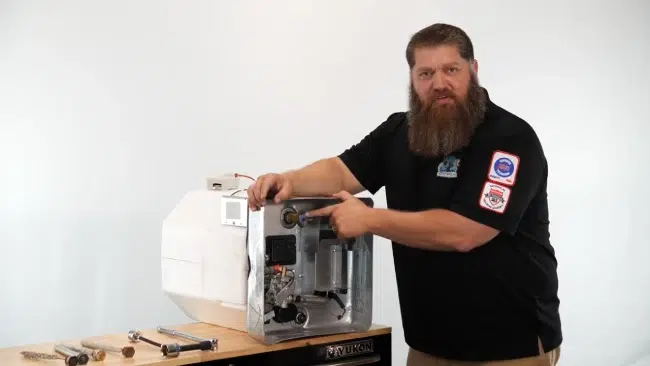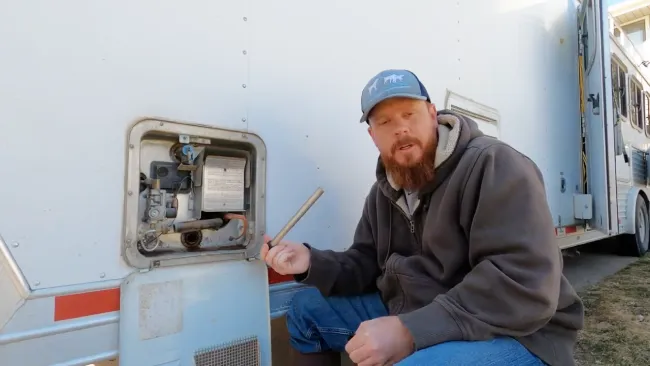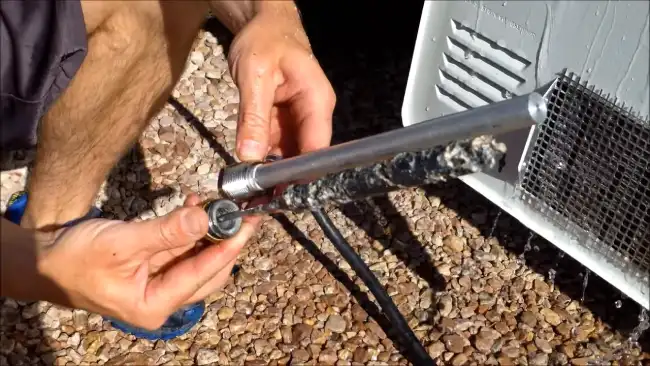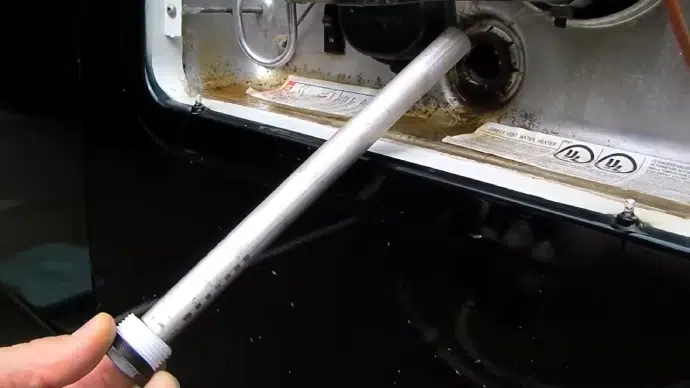Last Updated on December 24, 2023
As an RV owner, you might wonder if your water heater has an anode rod. It’s a good question to ask, as anode rods play a crucial role in protecting your tank from corrosion and rust.
Not all RV water heaters have anode rods. While most traditional RV water heaters have an anode rod to protect the tank from corrosion and rust, some exceptions exist. Manufacturers have started installing aluminum tanks or tankless water heaters in RVs, which do not require an anode rod.
Aluminum tanks are more resistant to corrosion due to the reactive nature of aluminum. They can last longer than steel tanks without an anode rod but not as long as steel tanks with proper protection. Let’s look at why not all RV water heaters contain anode rods in more detail.
Why Don’t All RV Water Heaters Have Anode Rods?

If you’re wondering why not all RV water heaters are equipped with anode rods, there are a few reasons to consider. Here’s why:
1. Alternative Tank Materials
RV water heaters with aluminum tanks offer a more corrosion-resistant alternative to steel tanks.
Aluminum is a reactive material that forms a protective layer over time, which makes it less susceptible to rust and other forms of corrosion. This is why some RV manufacturers opt for aluminum tanks instead of steel.
Remember that even aluminum tanks require proper maintenance and protection to ensure longevity.
The tank may still corrode over time without an anode rod due to other factors such as water quality and pH levels.
So, inspecting the tank regularly and performing any necessary maintenance, such as flushing the tank and replacing worn-out parts, is recommended.
2. Plastic Drain Plugs
RV water heaters with plastic drain plugs typically don’t have anode rods. This is because plastic doesn’t conduct electricity, which is necessary for anodes to function effectively.
Without anodes, the water heater tank is more susceptible to corrosion. Manufacturers of RV water heaters that use plastic drain plugs have developed alternative corrosion protection methods.
Some of these methods include using high-quality tank materials, such as glass-lined steel or aluminum, and applying coatings to the tank’s interior. These methods help protect the tank from corrosion and extend the water heater’s life.
3. Tankless Water Heaters
Tankless water heaters are game-changers in water heating, offering endless hot water and cutting-edge technology.
These types of water heaters do not have a traditional storage tank and instead, heat water as it flows through the unit. This means there is no need for an anode rod since there is no tank to protect it.
Tankless water heaters use different mechanisms for heating water and are often made of materials that are resistant to corrosion. Here are some reasons why tankless water heaters are a popular choice among RV owners:
- They’re more energy-efficient than traditional water heaters so that you can save money on your energy bills.
- They take up less space than traditional water heaters, which is a huge plus in RVs where space is limited.
- They provide instant hot water, so you don’t have to wait for the water to heat up before taking a shower or washing dishes.
Technological advancements have made tankless water heaters more efficient and effective.
4. Advancements in Technology
You’ll be amazed at the latest technological advancements in water heating, providing more efficient and corrosion-resistant options for your RV.
Manufacturers have been able to develop RV water heaters that are more resistant to corrosion without the need for anode rods.
These newer models may utilize special coatings or advanced materials that provide sufficient protection against rust and corrosion.
These advancements in technology not only provide better protection against corrosion but they also offer improved energy efficiency.
With these new water heaters, you can enjoy long hot showers without worrying about the anode rod needing to be replaced.
Where is the anode rod located in an RV water heater?

The anode rod nestles inside the RV water heater’s tank, accessible through a top-mounted access port near the hot water outlet.
Over time, the anode rod will corrode and be consumed, sacrificing itself to protect the tank and extending the water heater’s life.
To inspect or replace the anode rod, remove the access panel or cover on the top of the water heater. This panel is usually secured with screws or fasteners and can be easily removed with a screwdriver or wrench.
Once the panel is removed, you can access the anode rod and inspect it for signs of wear and tear.
You need to check the condition of the anode rod periodically and replace it when necessary. Refrain from replacing the anode rod to avoid corrosion of the water heater’s tank, which can cause leaks and, ultimately, require a costly replacement.
How often should you replace the anode rod on your RV?
The frequency of replacing the anode rod in your RV water heater depends on various factors, such as water quality, the type of anode rod, and RV usage.
Inspecting the anode rod annually and replacing it when it has deteriorated to about 50% of its original size is recommended.
The lifespan of anode rods can range from 1 to 3 years. If corrosion or rust is observed on the tank, it may indicate the need for immediate replacement.
Regular monitoring of the rod’s condition is essential to prolong the life of your RV water heater and ensure optimal performance. So, keep a close eye on your anode rod and replace it as needed to avoid costly repairs later on.
What happens if you don’t replace the RV water heater anode rod?
If you don’t replace the anode rod, the water heater may start leaking, lose efficiency, or even fail altogether. Without a functional anode rod, the metal tank inside your RV water heater will start to corrode. This can lead to leaks and damage that require expensive repairs.
The water quality may also suffer as the tank corrodes, leading to poor taste and odor. Also, if you replace the anode rod on a regular basis, the lifespan of your water heater may be significantly improved.
Can you clean and reuse an RV water heater anode rod?
It is not recommended to clean and reuse the anode rod of an RV water heater. The anode rod is designed to corrode sacrificially in order to protect the tank from rust and corrosion.
Once it has deteriorated to a certain extent, it will no longer be effective and should be replaced.
Trying to clean and reuse a worn-out anode rod may result in inadequate protection for the tank, potentially leading to damage and decreased water heater lifespan.
It’s best to replace the anode rod according to the manufacturer’s instructions to ensure proper functionality and longevity.
Take your time with your water heater. Replace the anode rod as needed to keep it functioning at its best.
Are all RV water heater anode rods the same size?

RV water heater anode rods are commonly found in a standard size. It measures 9.25 inches in length and features ¾-inch threads that require a 1-1/16-inch socket for installation.
These dimensions have become the norm and are widely used in the industry. Please be sure to verify the specifics of your particular RV water heater with the manufacturer to ensure compatibility.
Manufacturers may have variations or unique specifications for their water heaters. It is always best to consult the manufacturer’s guidelines or documentation for the correct size and thread specifications of the anode rod.
This way, you can ensure that you use the appropriate anode rod for your RV water heater, promoting its longevity and optimal performance.
Revolutionizing RV Water Heater Protection: Say Goodbye to Rust
Using anode rods in RV water heaters has been a popular way of protecting the tank from rust and corrosion for years. Still, as innovation and technology advance, newer models of RV water heaters may not require an anode rod anymore.
Instead, they may use different protective and corrosion-resistant materials such as aluminum or other advanced coatings.
Regardless of which type of RV water heater you have, it’s always a good idea to consult the owner’s manual and installation instructions for proper maintenance and upkeep guidelines.
With routine maintenance, you can extend the life and performance of your RV’s water heater. And enjoy endless hot showers and clean dishes on your next adventure.



